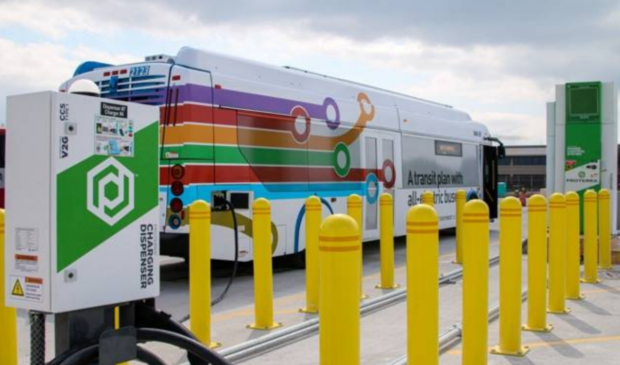Cap Metro cross-charges electric buses
Tuesday, October 27, 2020 by
Ryan Thornton The Capital Metropolitan Transportation Authority has been testing out the electric bus market this year with vehicles and charging systems from two different manufacturers. While the six Proterra and six New Flyer buses originally came with manufacturer-specific charging systems, Capital Metro has adapted the systems so that each charger is now able to connect with buses from either company.
“We understand from our partners that we are actually the first property in the nation, in all of North America, to be able to charge interoperably between New Flyer and Proterra and we’re quite pleased to have been able to offer that, the push to do that to the industry,” said Dottie Watkins, chief operating officer, at Monday’s board meeting.
In April 2019, the board approved purchase of the first four electric buses from Proterra at a cost of over $1 million each. Since then, the agency has ordered and received two additional Proterra buses and six New Flyer buses, including two 60-foot articulated buses. All 12 of the buses are now in service with permanent charging stations at the North Operations facility’s electric bus charging yard.
Even with the assistance from federal low-no emissions grants, Board Member Eric Stratton expressed concern last summer that investments in these buses and chargers could leave the agency with “orphan” buses that are not compatible with the charging system that is ultimately adopted for use as part of an all-electric bus fleet.
After working with both manufacturers, Watkins said Capital Metro now has the flexibility to “cross-charge” the vehicles with both sets of chargers. “As the transit industry looks forward to an electric future, it’s important that no one is locked into a particular manufacturer with the infrastructure that they put in,” Watkins said.
Whether or not Project Connect is approved next week, Capital Metro has committed to continue replacing its fleet with electric vehicles, beginning with its local bus fleet. The agency aims to purchase 71 electric buses over the next five years as it expands charging infrastructure at North Ops. In the long term, CEO Randy Clarke said the electric bus yard may also feature shade canopies with solar panels on top. The power was officially turned on at the bus yard on Oct. 16, in a public ceremony with Sen. Sarah Eckhardt, Commissioner Brigid Shea, Mayor Pro Tem Delia Garza and Council Member Ann Kitchen.
Assuming Project Connect is approved, Watkins said Capital Metro is now near to completing a modeling analysis to decide the best option for charging the first all-electric MetroRapid lines in the initial investment plan. Watkins said that could mean using charging stations at the end of bus routes or upgrading the chargers in the bus yard to meet the greater demand of the proposed MetroRapid routes.
As technology continues to improve, Capital Metro is also preparing to electrify its Metro Access and Metro Express bus fleets. Watkins said those vehicles “aren’t as mature in the market” for now. “I would predict that commuter coaches will become more readily available before paratransit vans,” she added.
The Austin Monitor’s work is made possible by donations from the community. Though our reporting covers donors from time to time, we are careful to keep business and editorial efforts separate while maintaining transparency. A complete list of donors is available here, and our code of ethics is explained here.
You're a community leader
And we’re honored you look to us for serious, in-depth news. You know a strong community needs local and dedicated watchdog reporting. We’re here for you and that won’t change. Now will you take the powerful next step and support our nonprofit news organization?









